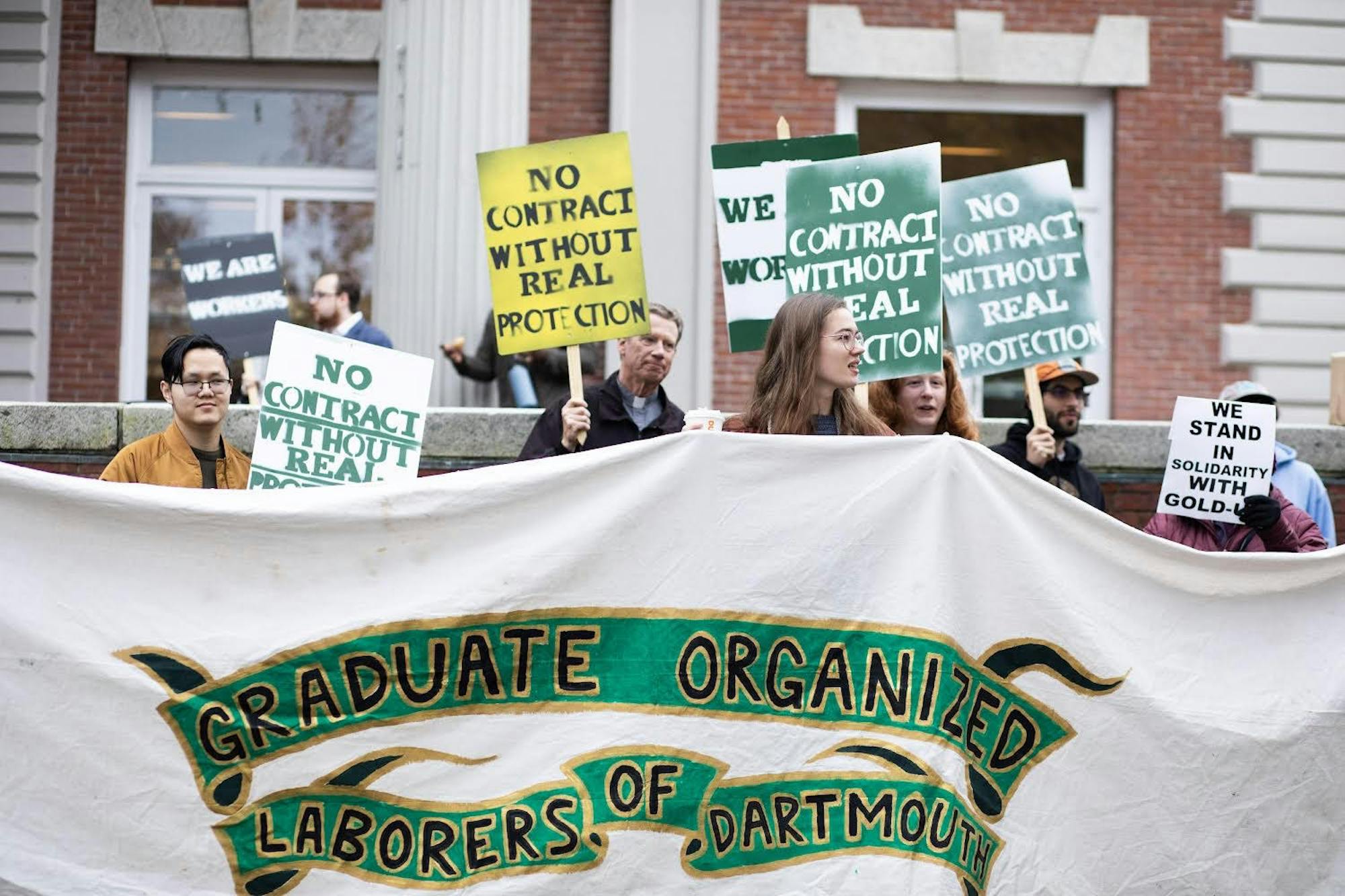In a Jan. 4 meeting, the Graduate Organized Laborers of Dartmouth-United Electrical Workers — the College’s graduate workers’ union — discussed proposals with the College on non-discrimination, international employee rights and discipline and discharge. The negotiations resulted in the College granting “the strongest set of [non-discrimination] protections in any grad worker contract,” according to Logan Mann, a third-year Ph.D student at the Thayer School of Engineering and GOLD-UE organizer.
Following the meeting, the contract increases protections against harassment and discrimination, Rendi Rogers, a GOLD-UE organizer and member of GOLD-UE’s bargaining committee, said.
“Along with the union being able to be there throughout [the Title IX and other investigative] processes, we also have mechanisms to intervene and hold the College accountable for actually following through with that process in a way that brings justice to our members when they face discrimination and harassment,” Rogers said.
Dartmouth had previously stated that GOLD-UE could not offer union support to members involved in situations of discrimination and harassment, Mann said.
In an email statement, Mann explained that the College has asserted that matters of discrimination, harassment, discipline and discharge “should be exempt from the grievous procedure.” This exemption would have prevented the union from submitting disputes between employees and their employers to a neutral third party to determine the settlement.
Mann, who is also a GOLD-UE Bargaining committee member, said in an interview that the College’s “highly offensive” and “unacceptable” position reflected similar policies at peer institutions, such as Massachusetts Institute of Technology.
GOLD-UE is still negotiating discipline and discharge and international workers’ rights with the College.
According to Mann, graduate students have been “fired [by the College] arbitrarily, even discriminated against… for sticking up against overwork and abusive lab practices.”
This practice has occurred because graduate workers are classified as graduate students; consequently, they are not “fired” but rather “[exit] their academic program,” Mann said.
A newly-defined distinction would allow union members to “grieve their termination as it pertains to our work,” Mann said.
The issue of opportunities for international graduate workers also remains contentious at the bargaining table. Mann and Rogers expressed their disappointment with the College’s policy with regards to curricular practical training and optional practical training.
While domestic students are able to take internships and leave with permission from their professors, international students are not granted the same opportunities, Mann said. In addition to the legal limitations placed on international students, the College currently places further restrictions on their ability to seek outside employment and internship opportunities.
“We believe that international students should have the same rights to these opportunities within the bounds of the laws as domestic students,” Mann said.
The College’s Office of Communications did not respond to multiple requests for comment on behalf of the College’s bargaining board.
For months prior to the Jan. 4 meeting, GOLD-UE has been engaged in contractual negotiations with the College for strengthened protections. Rogers explained that members of GOLD-UE feel that these direct confrontations with administrators and the College’s bargaining committee caused the College to concede to the union’s terms at the meeting on Jan. 4.
“Through these direct actions and the growing militancy within our unit, we were able to force concessions,” Rogers said.
On Oct. 3, union members spoke at negotiations to the College’s bargaining team about their experiences with the Title IX system. After the College refused to bargain on the issue at the next meeting on Oct. 9, GOLD-UE believed it was necessary to escalate the issue, according to TKTK.
At a graduate and professional student meet-and-greet dinner on Nov. 13, around 40 GOLD-UE members presented College President Sian Beilock with a letter of demands, according to Mann. The letter asked that she release a statement of public support before aNov. 16 bargaining session and work to ensure the union’s non-discrimination articles were accepted.
Beilock missed the deadline to make public statements, and the bargaining board refused to respond to GOLD-UE’s non-discrimination proposals at the Nov. 16 bargaining session. As a result, 50 GOLD-UE members packed the in-person bargaining room, and another 50 joined the meeting over Zoom. Following a 20-minute break called by the College’s bargaining board, the bargaining board provided total concessions on two other proposed articles but still did not respond to questions about non-discrimination, according to Mann.
GOLD-UE organized 100 members and community supporters to attend a speech given by Beilock at the Hanover Inn on Dec. 4. In the bargaining session that day, the College indicated a willingness to discuss the non-discrimination issue, and at the most recent meeting on Jan. 4 agreed to GOLD-UE’s proposal.
In an email statement, College spokesperson Jana Barnello wrote that Beilock is “aware” of GOLD-UE’s unanswered demands.
“Out of respect for the collective bargaining process, President Beilock has consistently referred all issues brought forward by GOLD-UE to that process,” Barnello wrote.
Mann said that the favorable outcome for the union on non-discrimination has inspired hope for future negotiations.
“Our takeaway is that, whenever an employer draws a red line, it almost never holds against a well-organized union,” Mann said.




